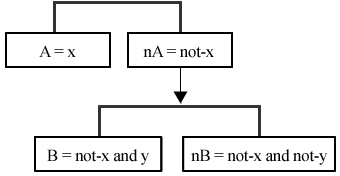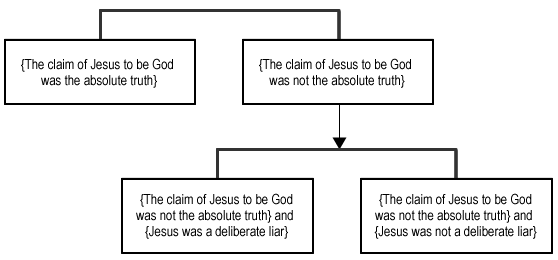Who was Jesus? Once again, the question cannot be answered with certainty but so much evidence can be amassed in support of a particular answer that a final step of faith is small and guided as opposed to large and blind.
Let us begin by trying to find out who Jesus claimed to be. Based on Chapter 8, "who he claimed to be" was accurately recorded in the New Testament autographs. Based on Chapter 7 we can learn the content of these autographs using the Greek text derived from more than 5000 manuscripts and manuscript fragments. Finally, if we consult a translation faithful to the Greek text, we are not even required to learn Greek.
The fifth chapter of John tells us Jesus broke the fourth commandment by healing a man on the Sabbath; He then encouraged this man to likewise violate the Sabbath by telling him to pick up his bed and carry it away. When confronted by the Jews, Jesus said He was working because his Father was working. To the Jews, this meant Jesus was making himself equal with God.
In the eighth chapter of John, Jesus claimed to have existed as a person since before Abraham was born.
The tenth chapter of John indicates Jesus claimed to be one with the Father; the Jews understood this to mean Jesus was making himself out to be God.
When Jesus appeared to "doubting" Thomas, as recorded in the twentieth chapter of John, Thomas addressed him as God; Jesus accepted this greeting.
Jesus healed a paralytic in the second chapter of Mark but, before the physical healing, He forgave the man's sins. Scribes in the audience asked themselves, "Who can forgive sins but God alone?"
In the fourteenth chapter of Mark, the high priest asked Jesus if He was the Son of God. Jesus replied, "I am."
These examples show who Jesus claimed to be; Jesus claimed to be God! He was executed, not for any crime against man, but for something that would be blasphemy if not true. Was the claim of Jesus true or false?
This question will be addressed with the help of the generic two level logic tree in Figure 3.

Figure 3. Generic two level logic tree.
The statements located at branch tips are A, B, and nB. The fact that one and only one of these three statements must be true can be seen by: (1) assigning "false" to any group of two and deducing the value of the third and (2) assigning "true" to any one of the three and deducing the values of the other two:
|
A = 0
|
|
x = 0
|
|
|
|
B = 0
|
implies
|
y = 0
|
implies
|
nB = 1
|
|
|
|
x = 0
|
|
B = 0
|
|
nB = 1
|
implies
|
y = 0
|
implies
|
A = 0
|
|
A = 0
|
|
x = 0
|
|
|
|
nB = 0
|
implies
|
y = 1
|
implies
|
B = 1
|
|
|
|
x = 0
|
|
nB = 0
|
|
B = 1
|
implies
|
y = 1
|
implies
|
A = 0
|
|
B = 0
|
|
|
|
|
|
nB = 0
|
implies
|
x = 1
|
implies
|
A = 1
|
|
|
|
|
|
nB = 0
|
|
A = 1
|
implies
|
x = 1
|
implies
|
B = 0
|
|
|
Now consider the logic tree in Figure 4 concerning the identity of Jesus.

Figure 4. Logic tree concerning the identity of Jesus.
One and only one of the three statements located at branch tips must be true.
(1) The claim of Jesus to be God was the absolute truth.
(2) The claim of Jesus to be God was not the absolute truth and Jesus was a deliberate liar.
(3) The claim of Jesus to be God was not the absolute truth and Jesus was not a deliberate liar.
The subsequent paragraphs of this chapter will examine the likelihood that statements (2) and (3) represent truth. The falsity of these two statements and, therefore, the truth of statement (1) cannot be established with certainty. However, so much evidence can be amassed in support of this position that a final step of faith is small and guided as opposed to large and blind.
(2) Jesus knew his claim to be God was false.
This means Jesus was a blasphemous, pernicious, hypocritical and foolish liar!
- Blasphemous because His claim would have been an insult to God.
- Pernicious because He asked others to trust Him alone for their eternal destiny.
- Hypocritical because He told others to be honest whatever the cost.
- Foolish because it was His claim to be God that led to his crucifixion.
If you believe the New Testament autographs provided an accurate account of what Jesus said and did then you can study the character of Jesus using a good translation of the derived Greek text. In those pages, you will discover the most pure and noble person in recorded history. How could a deceitful, selfish, depraved man have flawlessly lived the life of a pure and noble person? I don't know of a way. Do you?
(3) Jesus did not know his claim to be God was false.
This means Jesus actually believed He was God even though He really wasn't; in other words, Jesus was insane! I challenge you to read chapters 5, 6 and 7 in the Book of Matthew and conclude you have read the words of a madman. I challenge you to pick up a red-letter edition of the New Testament, read all the teachings attributed to Jesus and conclude you have read the ravings of a lunatic.
I contend that statements (2) and (3) on our logic tree must be viewed as false based on all available evidence. Therefore, statement (1) can be viewed as true with near certainty. The final step of faith required to believe that Jesus was God is small indeed.
Notice our logic tree offers only three alternatives:
One and only one of these three L's was an accurate description of the man Jesus. What about that other option selected by most people in the world today?
"Jesus was clearly a fine, articulate fellow - perhaps even a prophet of God - who offered lofty principles, sound teaching and great leadership but, just as clearly, Jesus was not God."
The fact that Jesus claimed to be God makes this belief irrational. Neither a deceitful liar nor a crazy person can be viewed as a great moral leader of men. Finally, if Jesus' claim to be God was true when He walked the earth 1970 years ago, then surely He is still God today.

